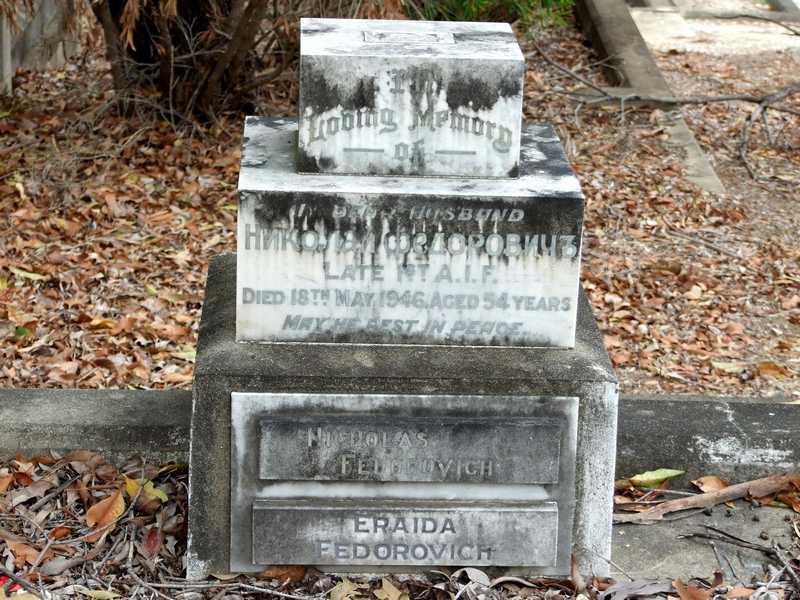Nicholas Fedorovich
| Russian spelling | Николай Иосифович Федорович |
|---|---|
| Born | 27.07.1891 |
| Place | Odessa, Ukraine (in fact Krasnoe, Maloarkhangelskoi volosti, Orlovskoi gubernii) |
| Ethnic origin | Ukrainian / Russian |
| Religion | Russian Orthodox |
| Father | Useff [Osip Efimovich] Fedorovich [from village Buty, Podolsk Province] |
| Mother | Efrosinia Zviginsova [Efrosiniia Gerasimovna Zviagintseva] |
| Family | Wife Eraida Fedorovich (nee Nejinzeva (Nezhintseva), 1904-1968) |
| Residence before arrival at Australia | Since early childhood lived with his family in Odessa. Worked as journalist for Russian and Manchurian papers |
| Arrived at Australia |
from Russia on 21.08.1911 per Kumano Maru disembarked at Brisbane |
| Residence before enlistment | Cairns, Qld |
| Occupation | 1915 clerk, cane cutter; 1919 cinematograph operator; 1920 soldier selector; 1930 grazier |
| Naturalisation | 1921 |
| Residence after the war | Brisbane, Stanthorpe, 1921-1922 trip to London, 1924-1925 trip to the USA and UK; 1925 Brisbane |
| Died | 18.05.1946, Brisbane, Qld |
Service #1
| Service number | 1952 |
|---|---|
| Enlisted | 23.01.1915 |
| Place of enlistment | Cairns (re-attested at Enoggera, Qld 6.04.1915) |
| Unit | 9th Battalion, Administrative Headquarters, London |
| Rank | Private, ER/Corporal |
| Place | Gallipoli, 1915, England, 1916-1917 |
| Final fate | RTA 11.01.1918 |
| Discharged | 22.05.1918 MU |
Materials
Digitised naturalisation (NAA)
Digitised service records (NAA)
Digitised Embarkation roll entry (AWM)
AIF Headquartes (London) file (AWM)
Alien registration 1 2 (NAA)
Eraida Fedorovich's arrival to Brisbane (NAA)
Blog article
Newspaper articles
L. Berk et al., 'Russian Soldiers' Protest'. - Daily Mail, Brisbane, 17 September 1918, p. 7.
Russian Journalist. Experiences with the A.I.F. - Cairns Post, 19 December 1919, p. 8.
Kismet. (By a Cairns Soldier). - Cairns Post, 20 December 1919, p. 3.
The Author of "Kismet". - Cairns Post, 22 December 1919, p. 4.
Nicholas Fedorovich. Kismet. - The Queenslander, Brisbane, 28 August 1920, pp. 34-35.
Fedorovich. Mr Theodore and Jugo-Slavs. - The Brisbane Courier, 6 November 1928, p. 7.
Fedorovich. - The Courier-Mail, Brisbane, 21 May 1946, p. 10.
From Russian Anzacs in Australian History:
At the end of 1915 Nicholas Fedorovich, who was in the 9th Battalion, contracted enteric fever at Gallipoli and was invalided to London. Before being invalided out, he obtained permission from his commanding officer to seek leave, when he had recovered, to go to Odessa and visit his sick mother (Gallipoli was indeed that close to Russia). He obtained leave from the War Office in London, from where he set off to Odessa. 'In his Australian uniform, he was an object of much admiration in the grain city', he told the Cairns Post after the war. When he was in Petrograd on his way back to England, the paper reported, 'the interest he had created in the south grew more and more. Russia was then the most powerful of the Allies, and was driving the Germans back from the eastern frontier. He was followed around by crowds of people. When he entered cafes people rose and greeted him warmly. Groups of people listened with amazement to his stories of the great Commonwealth beyond the seas where the minimum wage for labourers was 8/- a day! The Russian military authorities decided that Fedorovich would be a valuable asset in their army, in imbuing the soldiers with fighting qualities. The news of the Anzacs' brilliant charges at Gallipoli had given them a high opinion of the Australians as fighters, and Fedorovich found himself under orders to proceed to the eastern front. In vain he protested. He had an interview with the British Ambassador, who was unable to help him.' Only after spending several months on the Russian Front did he manage to get back to London and rejoin the AIF, serving as an interpreter.
From Falling stars: The story of Anzacs from Ukraine:
The assimilation of our Anzacs in Australian society was facilitated not only by their comrades in the army but by women as well. A rare document from Nicholas Fedorovich [...] gives us an opportunity to see the human being behind the clumsy and compressed official records, in which their words were occasionally quoted. Fedorovich's short story, Kismet - fate - was written in Russian, translated by Victor Marsden, the Russian correspondent of the Morning Post, and published after the war in a North Queensland newspaper. It is emblematic that this earliest sample of Ukrainian literature in Australia was inspired by the author's experience on the battlefront with his 9th Battalion comrades.
Gallery

Nicholas Fedorovich tombstone
Dutton Park Cemetery, Brisbane
 Russian Anzacs
Russian Anzacs